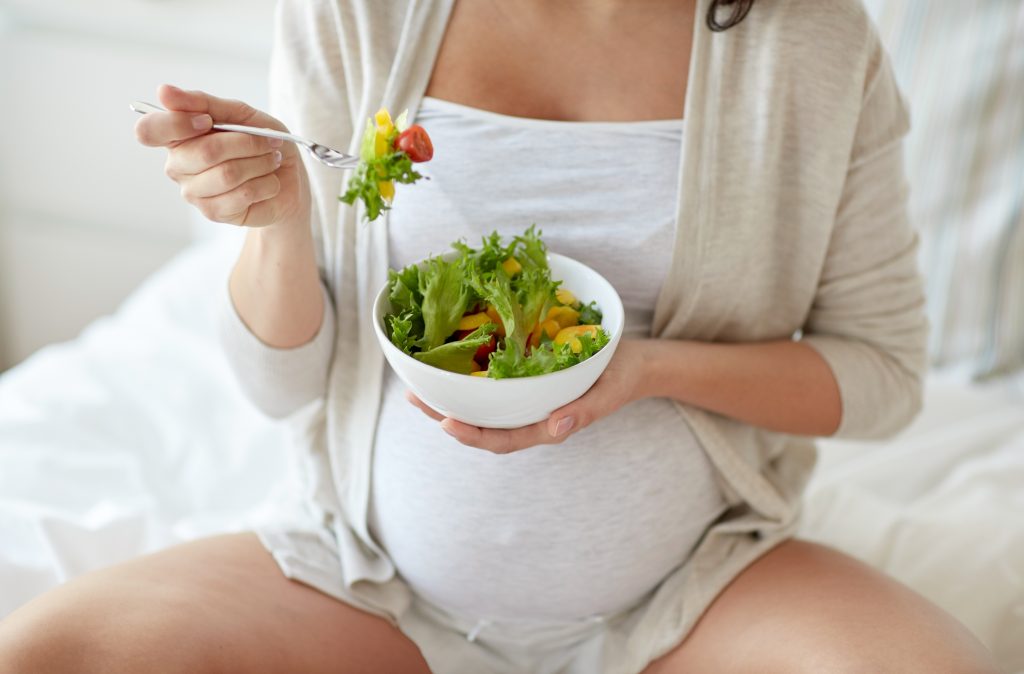Pregnancy Nutrition
Here is our second in the Nutrition Series by Stacy Heckenberg BHSc Nut. Med. This one focuses on what to eat when you are expecting.
Exercise and Cravings
So, you’re pregnant! Congratulations! Welcome to 40 weeks of having your body pushed to its limits. You will change weight and shape constantly during this time, but during pregnancy it is important to maintain a healthy weight to reduce the risk of gestational diabetes and birth complications. Gentle exercise is still ok for most women – think walking, swimming and yoga – but always check with your doctor first. And remember those pelvic floor exercises. You will appreciate that you did them – Hello during birth, and afterwards.
During your pregnancy you may experience food cravings, or aversions. Sometimes things you would normally love suddenly turn your stomach – even just the smell of them. Don’t worry – once baby is with you these aversions will disappear and you can go back to the things you love. Craving things like pickles on ice-cream is not uncommon, but if you are craving things like chalk or dirt it may be an indication of an iron deficiency. As with exercise, talk to your doctor.
Morning Sickness
If you’re like me, you may experience the dreaded morning sickness – or as I like to call it ALL DAY sickness. Morning sickness affects about 80% of women, and usually only lasts through the first trimester, although for some women it lasts until baby arrives.
This can sometimes make you feel like you are not getting the nutrition you need for your growing baby. Don’t worry, it may not feel like it but your body knows what it is doing.
To combat those queasy moments here are some tips:
- Eat small, frequent meals. You will feel better if your tummy doesn’t get too empty
- Always have dry food like crackers, toast, rice cakes and breadsticks on hand to nibble on when you feel unwell
- Reduce your intake of fatty and spicy foods
- Sip on ginger tea
What to Eat – and what Not to Eat
It is important to choose healthy, nutrient dense foods while you are ‘eating for two’.
Avoid fatty and sugary foods. This will give you the optimal nutrient intake, while avoiding excess weight gain during pregnancy.
Things to eat include:
- Fresh fruit and vegetables
- Protein – lean meat, poultry, fish, eggs or tofu
- Good fats – avocado, nuts, seeds and olives
- Folate rich foods like broccoli, cabbage, cauliflower, spinach, zucchini and beans
There are also some foods you should avoid because of the risk of a bacteria called listeria, which is linked to a range of problems in pregnancy including miscarriage and preterm birth. Foods you should avoid during pregnancy are:
- Deli meats
- Raw eggs and meats
- Soft cheeses
- High mercury fish like ahi tuna and swordfish
- Unwashed fruit and vegetables
If you have eaten something that you feel may have been risky, talk to your doctor straight away.
The Role of Nutrients
If you read our blog on Conception nutrition, you will already know this, but there are a few nutrients that are particularly important to your baby during pregnancy:
Zinc – this helps with the construction of healthy cells, strengthens immunity and helps process other nutrients. Foods rich in zine include meat, legumes, nuts, dairy, eggs, wholegrains and seeds.
Folate – helps prevent neural tube defects like spina bifida. Foods to include in your diet are leafy greens, asparagus, citrus and eggs, as well as a supplement.
Vitamin D – aids in the development of baby’s nervous system and skeleton. Get plenty of fatty fish, like herring and salmon, cheese and eggs.
Iodine – ensures a healthy thyroid gland, which manages most of our bodily functions. Foods to include are milk, yoghurt, cheese, tinned tuna and seaweed.
I hope these suggestions help keep you fit and healthy during the incredible time that is pregnancy.
Yours in health
Stacy
www.hillsdistrictnutritionist.com
If you would like more information on any aspect of conception, pregnancy, birth and postpartum, I would love to have chat with you:
